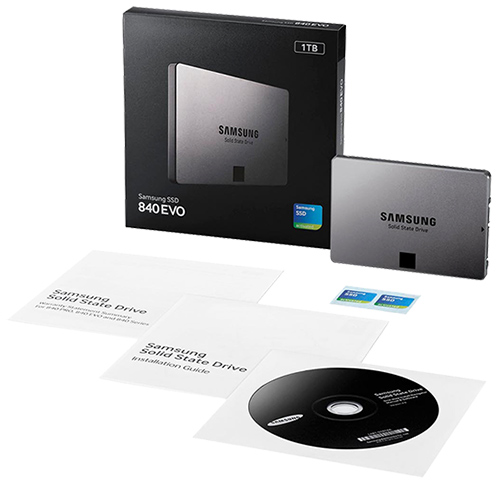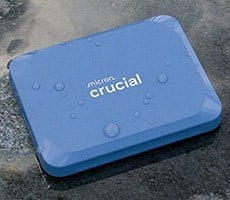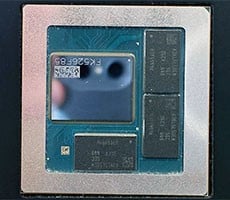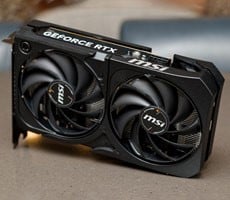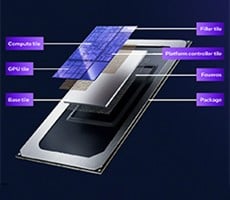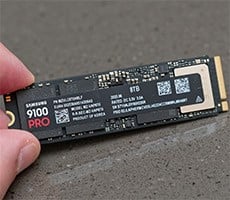Samsung SSD 840 EVO 250GB & 1TB Drives Tested
Samsung has been aggressively bolstering its solid state drive line-up for the last couple of years. While some of Samsung’s earliest drives may not have particularly stood-out versus the competition at the time, the company’s 830 series and more recently the 840 series of solid state drives—especially the 840 Pro--have been excellent, both in terms of value and overall performance in their target markets.
Today we’re going to give you a taste of a couple of Samsung’s latest consumer-class solid state drives in the just-announced the 840 EVO series of products. As the name suggests, the SSD 840 EVO series of drives are an evolution of the Samsung 840 series. These drives use the latest TLC NAND flash to come out of Samsung’s fab, along with an updated controller, and also feature some interesting software that can significantly impact performance as well. Take a look at the specifications for the new Samsung SSD 840 series of drives below and then strap yourself in as we take a look at one of the more interesting solid state drives to come across our test bench in quite a while...
|
| Usage Application | Client PCs* |
| Capacity | 120GB, 250GB, 500GB, 750GB and 1TB |
| Dimensions (L* W* H) | 100 x 69.85 x 6.8 (mm) |
| Interface | SATA 6Gb/s (compatible with SATA 3Gb/s and SATA 1.5Gb/s) |
| Form Factor | 2.5-inch |
| Controller | Samsung MEX controller |
| NAND Flash Memory | 1x nm Samsung Toggle DDR 2.0 NAND Flash Memory (400Mbps) |
| DRAM Cache Memory | 256MB (120GB) or 512MB(250GB&500GB) or 1GB (750&1TB) LPDDR2 |
| Performance | Sequential Read: Max. 540 MB/s |
| Sequential Write: Max. 520 MB/s (250GB/500GB/750GB/1TB), 410 MB/s (120GB) | |
| 4KB Random Read (QD1): Max. 10,000 IOPS | |
| 4KB Random Write(QD1): Max. 33,000 IOPS | |
| 4KB Random Read(QD32): Max. 98,000 IOPS (500GB/750GB/1TB), 97,000 IOPS (250GB), 94,000 IOPS (120GB) | |
| 4KB Random Write(QD32): Max. 90,000 IOPS (500GB/750GB/1TB), 66,000 IOPS (250GB), 35,000 IOPS (120GB) | |
| TRIM Support | Yes (Requires OS Support) |
| Garbage Collection | Yes |
| S.M.A.R.T | Yes |
| Encryption | AES 256-bit Full Disk Encryption (FDE) PSID printed in SSD label |
| Weight | Max. 53g (1TB) |
| Reliability | MTBF: 1.5 million hours |
| Power Consumption | Average :100mW*** (Typical) Idle : 45mW (Typical, DIPM ON) |
| Temperature | Operating: 0°C to 70°C Non-Operating: -55°C to 95°C |
| Humidity | 5% to 95%, non-condensing |
| Vibration | Operating: Random: 2.17Grms (7~800Hz) |
| Non-Operating: | Random: 3.08Grms (7~800Hz) |
| Shock | 1500G & 0.5ms (Half sine) |
| Warranty Price: |
3 years limited 120GB at $109.99 and 250GB at $189.99 currently |
If you really spent the time to go through the specifications listed here, you’ll no doubt have noticed that Samsung will be offering drives in the 840 EVO series with capacities ranging from 120GB all the way up to a whopping 1TB. Like other SSDs, performance varies between the different capacities, but overall the 840 EVO series is poised to offer class-leading performance, if Samsung’s numbers hold true in the real-world, of course. Rest assured, we’ll be finding out shortly. Along with all of those different capacities, Samsung will also be offering various retail products targeting different market segments. There will be standalone drives in all capacities offered for desktop users and for mobile users, Samsung will be offering kits that include migrations software, a USB adapter, and 7mm to 9mm shim as well. All of the actual drives used in the desktop and mobile variants, however, will be similar—it’s only the bundled accessories that will be different.

